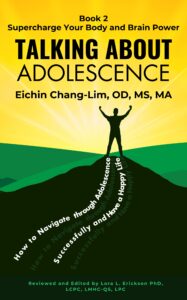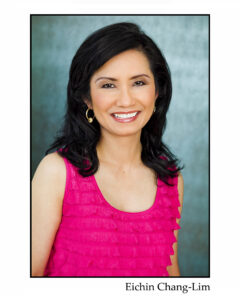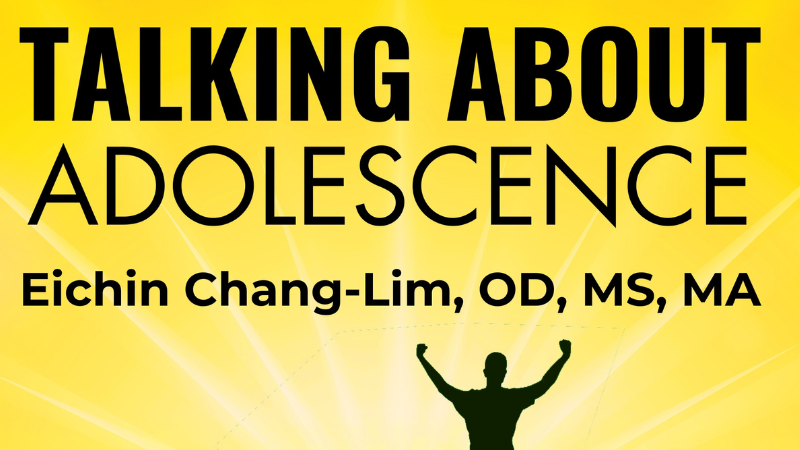 LOS ANGELES – In her latest book, “Talking About Adolescence: Supercharge Your Body and Brain Power,” Dr. Eichin Chang-Lim draws on her impressive academic credentials and award-winning writing to offer inspirational and practical insights to young people.
LOS ANGELES – In her latest book, “Talking About Adolescence: Supercharge Your Body and Brain Power,” Dr. Eichin Chang-Lim draws on her impressive academic credentials and award-winning writing to offer inspirational and practical insights to young people.
Confused by changing moods and a growing body?
Embark on an exhilarating journey of self-discovery with “Supercharge Your Body and Brain Power”—the ultimate guide to navigating adolescence with confidence and empowerment.
Unveil the science behind your changing body and harness the secrets to unlocking your brain’s full potential. Learn to manage mood swings, conquer stress, and make healthy choices while building resilience to overcome challenges.
Written in an engaging, conversational style with a fun “PowerPoint” format, this book is not just a read—it’s a toolkit for shaping a bright future. Thought-provoking questions and reflective exercises ensure lasting understanding.
This book is a must-have resource for teens, young adults, parents, educators, and anyone invested in teen development. Don’t wait to unlock your full potential—order your copy today and supercharge your life!
“Talking About Adolescence: Supercharge Your Body and Brain Power”
Eichin Chang-Lim | Oct. 29, 2024 | BookBaby
Nonfiction | Adolescence
Paperback | ISBN: 979-8-35095-992-5 | $25.99
E-Book | ISBN: 979-8-35095-993-2 | $8.99
 Dr. Eichin Chang-Lim holds a master of arts in psychology, a doctorate in optometry, and a master of science in microbiology. She is a multi-award-winning author of romantic fiction, short stories, memoirs, and self-help books. Her works explore the intricacies of human relationships and the human spirit’s resilience, evolving into inspirational tales that are both multidimensional and thought-provoking. Her books have won numerous awards, including the Writer’s Digest Self-Published Book Award (first place), the IndieReader Discovery Award (winner), the Readers’ Favorite Book Award (gold medal winner), the BIBA™ Literary Award (winners), etc.
Dr. Eichin Chang-Lim holds a master of arts in psychology, a doctorate in optometry, and a master of science in microbiology. She is a multi-award-winning author of romantic fiction, short stories, memoirs, and self-help books. Her works explore the intricacies of human relationships and the human spirit’s resilience, evolving into inspirational tales that are both multidimensional and thought-provoking. Her books have won numerous awards, including the Writer’s Digest Self-Published Book Award (first place), the IndieReader Discovery Award (winner), the Readers’ Favorite Book Award (gold medal winner), the BIBA™ Literary Award (winners), etc.
Chang-Lim is passionate about using her writing to make a difference in people’s lives. “Every human being is valuable; every soul is unique and special,” she says. “I write with my heart and soul. My mindset is that if my writing can make a difference in even one person’s life, it’s all worth it, and that’s what love is all about.”
Chang-Lim lives in Orange County, California, with her husband and their poodle mix, Gabby.
For more information about Chang-Lim and her work, visit https://eichinchanglim.com.
Follow Eichin Chang-Lim on social media:
Facebook: @authoreichinchanglim | Twitter (X): @EichinChangLim
Instagram: @eichinchanglim
In an interview, Eichin Chang-Lim can discuss:
- Personal Inspiration – Witnessing her own children’s challenges growing up and working with teens struggling with addiction, gangs, gun violence and suicide during her career as an optometrist. Plus, how her own upbringing in Asia and how the lack of open conversations about mental health fueled her drive for helping teens.
- Interdisciplinary Influence – How her backgrounds in psychology, microbiology and optometry helped her understand the intricacies of human health, mind and behavior.
- Parental and Educator Support – Tips for adults to have open discussions and navigate sensitive topics with teens.
- Challenges Facing Teens – Depression, anxiety, eating disorders, substance addiction, social media obsession and making sound decisions when facing challenges.
- Building Resilience – Practical strategies for self-care, managing stress, avoiding harmful behavior, learning from role models, creating support systems and seeking professional help.
- Empowering Teens – Providing knowledge to help teens stay on the right path, helping them build resilience and making smart choices. Plus, why understanding their development helps promote self-acceptance, better decision-making and empathy.
- Neuroscience Insights – The importance of understanding brain development and its impact on behavior and decision-making.
- Influence of Fiction Writing – Using her skills as a romance and memoir writer to create engaging, relatable self-help books for teens.
An Interview with
Eichin Chang-Lim
What inspired you to write “Talking About Adolescence: Supercharge Your Body and Brain Power?”
As a mother of two adult children, I have witnessed firsthand the struggles they faced during their difficult teenage years. Additionally, throughout my 30-plus-year career in eyecare, I have worked closely with many teens and young adults. It is heartbreaking to see some of them go astray—lacking inspiration for the future, succumbing to substance addiction, joining gangs and losing their lives to violence, or appearing outwardly healthy but ultimately committing suicide or engaging in criminal behavior.
These young individuals never intended to ruin their lives, but the powerful influences of social media and peer pressure often led them astray. This inspired me to write the “Talking About Adolescence” series. My goal is to provide these vulnerable youths with the guidance and knowledge they need to navigate these challenging years and stay on the right path.
Book 2 is “Supercharge Your Body and Brain Power.” This book aims to empower them with knowledge about their body and brain development during critical times so they can build resilience, make smart choices, and confidently navigate the complexities of adolescence. Reach their full potential, have fulfilling lives, and become contributing citizens to the community.
Can you discuss your diverse and multifaceted academic background? What motivated you to pursue several advanced degrees?
I began my academic journey with an undergraduate degree in medical technology. My passion for microbiology brought me to the USA in my early 20s, where I pursued a master’s degree in the field. Following this, I spent two years conducting research at the UCLA Medical Center. However, my curiosity didn’t stop there. The intricate and essential nature of the human eye inspired me to attend optometry school, leading to a career where I could make a difference in people’s lives.
While practicing as an optometrist, I found myself particularly drawn to the developmental stages of my younger patients. This interest sparked the idea of writing books for teens and young adults. To deepen my understanding and enhance my writing, I pursued a master’s in psychology focusing on developmental psychology. This multifaceted academic path has allowed me to explore and integrate diverse fields, ultimately enhancing my professional and personal endeavors.
How did your background in psychology, optometry and microbiology influence the content of your book?
My background in microbiology, optometry, and psychology has profoundly influenced the content of my book. Microbiology is closely linked to human health and daily life, offering valuable insights into the microscopic organisms that impact our overall well-being. Optometry, which focuses on vision, affects our movements, decision-making, and overall world perception. Psychology explores the workings of the mind, shaping our behaviors, emotional regulations, and behaviors.
Despite their apparent differences, these fields are deeply interconnected and play crucial roles in our daily lives and overall well-being. My understanding of these disciplines has allowed me to present a comprehensive and holistic perspective in my writing. By integrating microbiology, optometry, and psychology, I aim to provide readers with a profound understanding of how these aspects influence their body and mind.
What personal experiences shaped your approach to writing self-help books for teens?
My upbringing in Asia, where strict family discipline often associated physical punishment with success, profoundly influenced my journey as a self-help book author for teens. Aside from harsh discipline, I didn’t always have access to open conversations about mental health or any teen-related issues with adults. This is why I’m so passionate about writing self-help books for teens. While challenging, this experience has given me a unique perspective on the long-lasting effects of childhood adversity.
Childhood trauma can come in various forms. I addressed them in the book, and some of them are heart-wrenching. Current research supports the notion that childhood trauma can profoundly impact mental health and even echo through generations. This knowledge motivates me to illuminate these issues and promote the welfare of young people. Through my writing, I aim to empower those who have faced adverse childhood distress to seek support and healing.
How does your newest book promote making healthy choices and building resilience?
“Talking About Adolescence” empowers teens with neuroscientific-based knowledge to build inner strength and foster healthy habits.
The two main elements of resilience are internal and external resources. Adolescents can build their inner strength by encouraging open communication, celebrating growth, and providing safe challenges. Teens learn coping mechanisms and build confidence through goal-setting and problem-solving practice. Adolescents can acquire external resources by building support networks, such as by involving teens in community activities and providing access to counseling and support groups.
The book emphasizes the importance of self-care in sleep, exercise, and nutrition, as well as avoiding harmful behavior and substance addiction in forming healthy habits. It also encourages teens to learn from positive role models, build a strong support system, and seek help from professionals when needed without hesitation.
The book is a comprehensive guide, equipping teens with the indispensable tools to navigate adolescence and lay a solid foundation for a healthy future. This will make the audience feel prepared and confident.
How does your book differ from other teen self-help guides on the market?
In several ways, my book stands out from other teen/adolescent self-help guides:
- Personal Experience and Engagement: As a parent who has navigated the turbulent waters of adolescence with my own children, as well as someone who has worked closely with youth groups, I have a deep understanding of what resonates with teens. My aim is to engage them in a way that feels genuine and relatable, fostering a sense of connection and understanding.
- Conversational Style: I steer clear of dense, academic language and the stern, preachy tone often found in self-help books. Instead, I opt for a conversational style that presents research-based facts in a way that is approachable and simple to grasp, making the audience feel at ease and comfortable.
- Relevant Information: I focus on providing material pertinent to teens and young adults’ lives. The content addresses their specific concerns and challenges, ensuring they find the material practical and applicable.
- Interactive and Thought-Provoking: My book includes thought-provoking questions and exercises to encourage self-reflection and a more profound understanding. This interactive element helps teens actively reflect on the concepts, internalize them, promote a deeper understanding, and empower them to make informed choices and apply the information to their own experiences.
My book combines these elements to inform, engage, and empower teens, making it a unique and valuable resource in the self-help market for adolescents.
Did your background in writing romantic fiction and memoirs influence your approach to writing self-help books?
Absolutely! My experience writing romantic fiction and memoirs has significantly influenced my approach to writing self-help books for teens and young adults. In both genres, the focus is on emotional connection and understanding.
Romantic fiction taught me the importance of creating relatable characters and navigating complex emotions—both crucial writing aspects for teenagers grappling with their own emotional journeys.
Memoir writing honed my ability to craft personal stories that resonate with readers. This skill allows me to weave relatable anecdotes and real-life experiences throughout “Talking About Adolescence,” making the sometimes complex scientific concepts more engaging and easier for teens to understand.
Drawing on these skills from different genres, I can present information in a way that feels personal and engaging rather than simply technical, dry or prescriptive in nonfiction writing. For me, writing transcends mere words, regardless of genre. It’s a heartfelt exchange, a connection with readers that reflects the spirit of humanity.
How do you hope your new book uplifts those who read it?
Ultimately, I want to inspire hope and show that mental health and happiness are achievable, even in the face of invisible pain. By encouraging teens to seek help and support, the book aims to help them reach their fullest potential through healthy body and brain development.

A former award-winning journalist with national exposure, Marissa now oversees the day-to-day operation of the Books Forward author branding and book marketing firm, along with our indie publishing support sister company Books Fluent.
Born and bred in Louisiana, currently living in New Orleans, she has lived and developed a strong base for our company and authors in Chicago and Nashville. Her journalism work has appeared in USA Today, National Geographic and other major publications. She is now interviewed by media on best practices for book marketing.


